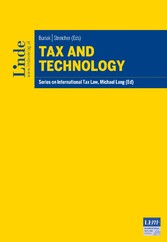Suchen und Finden
Service

Tax and Technology - Series on International Tax Law, Volume 137
The challenges and opportunities of new technologies in the tax field
Technological developments induced major reforms in the regulatory international and domestic tax landscapes as well as in the developments in the use of technology by tax administrations and taxpayers. New technology, especially the innovations in virtual asset-light cross-border business organizations, data analytics, service and process automation, on one hand, disrupted the well-established legal tax principles and rules and, on the other, stimulated informed data-driven and structured solutions in tax compliance. Technological advances affected nearly every area and each aspect of taxation: Direct tax regulations, indirect tax law, and tax procedures including tax compliance, and tax control functions.
International organizations such as the Organization for Economic Co-operation and Development (OECD), the United Nations (UN), and the European Commission as a supranational organization fostered critical legislative reforms and proposals among which are the OECD Two-Pillar Solution to Address the Tax Challenges Arising from Digitalisation of the Economy, Article 12B of the UN Model Tax Convention to tax automated digital services, new rules for tracing transfers of crypto-assets in the EU, as well as the EU’s VAT e-commerce package and “VAT in the Digital Age” package. While these proposals aim to address a wide range of the benefits and challenges of Economy 4.0, certain questions arise concerning the consistency of the legislative developments with their initial objectives, the appropriateness of the legal form for the economic substance of the regulated relations for the effectiveness of the regulations as well as their coherence.
This volume contains a collection of scientific chapters on the general topic "Tax and Technology" that were successfully completed by the 2022/2023 LL.M. graduates of the Institute for Austrian and International Tax Law, WU. The volume is divided into three parts that contain the contributions dealing with the impact of the technology on international tax law, indirect tax law, and procedural law. Each chapter provides an in-depth analysis of a unique research question aiming to innovatively contribute to the current debate and develop a practical approach for implementing the findings.
Alle Preise verstehen sich inklusive der gesetzlichen MwSt.







